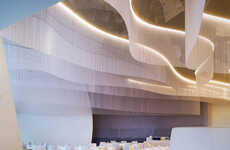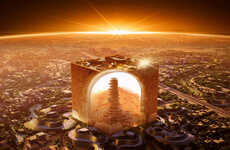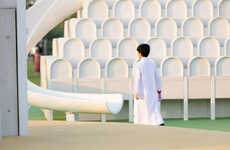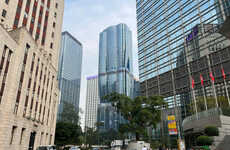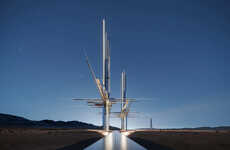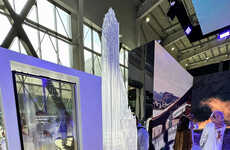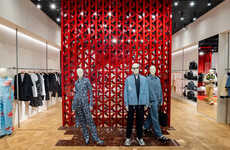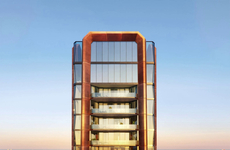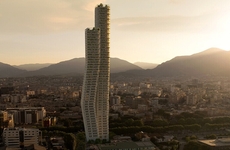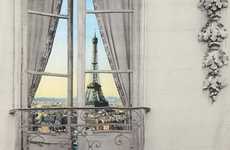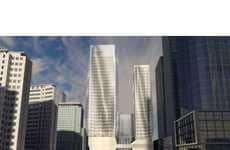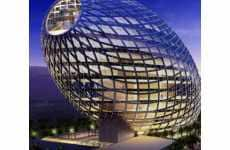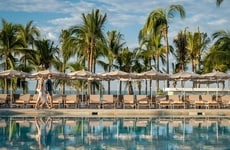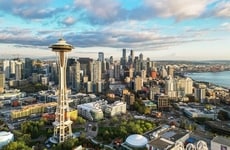
Kuwait's Iconic Landmarks
References: kuwaittimes.net
It looks like Kuwait is finally getting its long-awaited makeover, in the form of what's being dubbed as, "bling bling architecture." If things go as planned, the city will soon be home to four new buildings belonging to "the world's most iconic architectural wonders." That would put it in the same rankings as the Eiffel Tower, Sydney Opera House, London Bridge and Malaysia's Petronas Towers.
Burj Al-Arab in Dubai is "architecturally speaking, the most recognized and awe-inspiring of icons in the Middle East," the Kuwait Times reported. The building, which resembles a giant sail, is the world's tallest hotel and acts as a symbol for the city's "modernity, extravagance and extraordinary development."
Atkins, the architectural masterminds behind the Burk Al-Arab, see nothing but possibility in Kuwait where they are already planning four new buildings. "Each suggest an attempt at the iconic. From a slim-line high rise office building that seems to sway in the breeze to a hotel, commercial building resembling a king cobra, the structures - if built - would add a touch of the extraordinary and the fantastic to the skyline of Kuwait."
The challenge won't be an easy one. "Kuwait's sky high land prices, height and building restrictions and labyrinth bureaucracy can force the price of even a normal building into the multiple millions of dinars."
Architect Charles Jencks suggests that icon landmarks should go beyond function, acting also as symbols for that particular city, to reflect ideas or values. The Burj Al-Arab, for example, symbolizes "the emirate's modernity and ability to achieve what seems impossible - to turn a tiny, impoverished emirate into the region's financial and business hub."
"Would a cobra personify and symbolize Kuwait? Will it be what some have labeled 'bling bling architecture'? Or will the building of iconic buildings in Kuwait serve to spur development and growth and give Kuwait an identity recognized and respected by the rest of the globe?"
Burj Al-Arab in Dubai is "architecturally speaking, the most recognized and awe-inspiring of icons in the Middle East," the Kuwait Times reported. The building, which resembles a giant sail, is the world's tallest hotel and acts as a symbol for the city's "modernity, extravagance and extraordinary development."
Atkins, the architectural masterminds behind the Burk Al-Arab, see nothing but possibility in Kuwait where they are already planning four new buildings. "Each suggest an attempt at the iconic. From a slim-line high rise office building that seems to sway in the breeze to a hotel, commercial building resembling a king cobra, the structures - if built - would add a touch of the extraordinary and the fantastic to the skyline of Kuwait."
The challenge won't be an easy one. "Kuwait's sky high land prices, height and building restrictions and labyrinth bureaucracy can force the price of even a normal building into the multiple millions of dinars."
Architect Charles Jencks suggests that icon landmarks should go beyond function, acting also as symbols for that particular city, to reflect ideas or values. The Burj Al-Arab, for example, symbolizes "the emirate's modernity and ability to achieve what seems impossible - to turn a tiny, impoverished emirate into the region's financial and business hub."
"Would a cobra personify and symbolize Kuwait? Will it be what some have labeled 'bling bling architecture'? Or will the building of iconic buildings in Kuwait serve to spur development and growth and give Kuwait an identity recognized and respected by the rest of the globe?"
Trend Themes
1. Iconic Building Boom - The construction of new iconic buildings in Kuwait will spur investment and tourism while adding a touch of the extraordinary and the fantastic to the skyline.
2. Symbolic Architecture Trend - City landmarks that embody the ideas and values of a place, as opposed to only serving a functional purpose, are gaining prominence in architecture and design.
3. Bling Bling Architecture - The trend of 'bling bling architecture' - characterized by elaborate and ostentatious designs - is gaining traction in Kuwait and other cities around the world.
Industry Implications
1. Architecture and Construction - The development of new landmark buildings in Kuwait creates opportunities for architects, engineers, and construction companies to showcase their expertise and innovation.
2. Tourism and Hospitality - The addition of iconic structures to Kuwait's skyline will help attract tourists and business travelers, creating opportunities for hoteliers and restaurateurs to cater to a growing number of visitors.
3. Real Estate and Property Development - The investment and development of properties in Kuwait's booming real estate market presents opportunities for developers and investors to capitalize on the demand for new and unique properties.
4.5
Score
Popularity
Activity
Freshness

